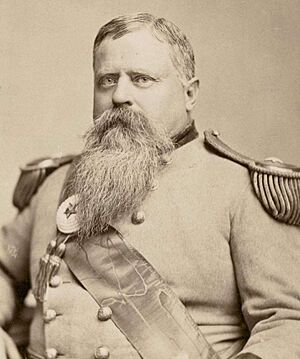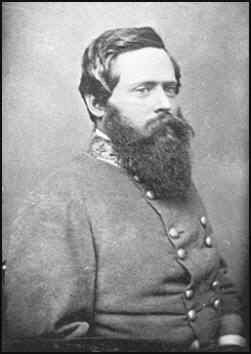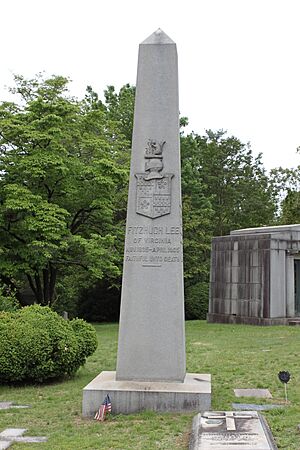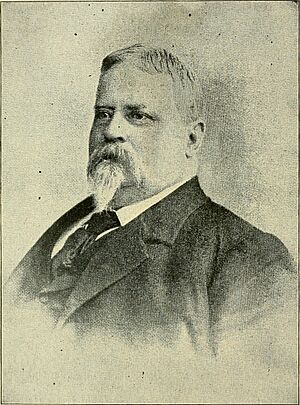Fitzhugh Lee facts for kids
Quick facts for kids
Fitzhugh Lee
|
|
|---|---|

Lee in 1885
|
|
| 40th Governor of Virginia | |
| In office January 1, 1886 – January 1, 1890 |
|
| Lieutenant | John E. Massey |
| Preceded by | William E. Cameron |
| Succeeded by | Philip W. McKinney |
| Personal details | |
| Born | November 19, 1835 Fairfax County, Virginia, U.S. |
| Died | April 28, 1905 (aged 69) Washington, D.C., U.S. |
| Resting place | Hollywood Cemetery Richmond, Virginia |
| Parents | Sydney Smith Lee Anne Marie Mason |
| Relatives | See Lee family |
| Signature | |
| Military service | |
| Allegiance | |
| Branch/service | |
| Years of service | 1856–1861, 1898–1901 (USA) 1861–1865 (CSA) |
| Rank | |
| Battles/wars | American Civil War Spanish–American War |
Fitzhugh Lee (born November 19, 1835 – died April 28, 1905) was an important figure in American history. He was a Confederate cavalry general during the American Civil War. After the war, he became the 40th Governor of Virginia. Later in life, he served as a diplomat and a general in the United States Army during the Spanish–American War. Fitzhugh Lee was the son of Sydney Smith Lee and the nephew of the famous General Robert E. Lee.
Contents
Growing Up and School
Fitzhugh Lee was born on November 19, 1835, in Fairfax County, Virginia. His family was well-known. His grandfather was "Light Horse Harry" Lee, a hero of the American Revolution. His uncle was Robert E. Lee, a famous general. His father, Sydney Smith Lee, was a naval captain. His mother, Anna Maria Mason Lee, was related to George Mason, who helped write important American documents.
Lee went to the United States Military Academy at West Point, New York. He graduated in 1856. After West Point, he became a second lieutenant in the 2nd Cavalry Regiment. His uncle, Robert E. Lee, was a lieutenant colonel in the same regiment. Fitzhugh Lee showed great bravery fighting against the Comanches in Texas. He was seriously hurt in a battle in May 1859. In 1860, he became a cavalry instructor at West Point. However, he resigned his position when his home state, Virginia, left the United States to join the Confederacy. This happened at the start of the American Civil War.
Serving in the Civil War

Fitzhugh Lee joined the Confederate States Army as a cavalry officer. He quickly moved up in rank. In September 1861, he became a lieutenant colonel. By July 1862, he was promoted to brigadier general.
Lee played a key role in many battles. During the Northern Virginia Campaign, his cavalry helped the Confederate army. He also fought well in the Maryland Campaign of 1862. He helped protect the Confederate army as it moved. At the Battle of Kelly's Ford in 1863, his small group of soldiers captured many enemy men and horses.
One of his most important actions was at the Battle of Chancellorsville in May 1863. Lee's scouting helped General Stonewall Jackson launch a surprise attack on the U.S. Army's side. This attack was a major success for the Confederates.
After Chancellorsville, Lee was sick for a month. He missed the Battle of Brandy Station, a big cavalry fight. But he recovered in time for the Gettysburg Campaign. His cavalry fought at the Battle of Gettysburg. After the battle, his soldiers helped protect the Confederate army as it retreated. Lee was promoted to major general in August 1863.
In the spring of 1864, Lee's cavalry division was very active. They helped slow down the U.S. Army in its race to the Battle of Spotsylvania Court House. After General Jeb Stuart was killed, Fitzhugh Lee became a key cavalry leader. He served under General Wade Hampton III.
Lee later joined General Jubal A. Early in the Shenandoah Valley. At the Battle of Opequon in September 1864, three horses were shot from under him, and he was badly wounded. On March 29, 1865, Fitzhugh Lee took command of all of Robert E. Lee's cavalry. He led the very last charge of the Confederates on April 9, 1865, at Farmville, Virginia, just before the surrender at Appomattox.
Life After the War
After the Civil War ended, Fitzhugh Lee became a farmer in Stafford County, Virginia. He worked hard to help people in the South accept the war's outcome. He believed it was time to move forward. In 1875, he spoke at the 100-year celebration of the Battle of Bunker Hill in Boston.
From 1886 to 1890, Fitzhugh Lee served as the governor of Virginia. He won the election in 1885. He also helped lead President Grover Cleveland's parades in 1885 and 1893.
Consul-General in Havana
In April 1896, President Cleveland appointed Lee as the consul-general in Havana, Cuba. This was a very important job, mixing diplomacy and military duties. He continued in this role under President William McKinley. He had to deal with a difficult situation in Cuba, which eventually led to the sinking of the warship USS Maine.
When war broke out between Spain and the United States, Lee rejoined the United States Army. He was one of four former Confederate generals who became major generals in the U.S. Volunteers. Lee commanded the 7th Army Corps. He later served as military governor of Havana and Pinar del Río in 1899. He retired from the U.S. Army in 1901 as a brigadier general.
Lee also helped plan the Jamestown Exposition, a big event held in 1907. He wrote several books, including a biography of Robert E. Lee called General Lee (1894) and Cuba's Struggle Against Spain (1899).
Death

Fitzhugh Lee passed away in Washington, D.C.. He is buried in Hollywood Cemetery in Richmond, Virginia.
Legacy
Lee received a pardon in 1869 for his actions during the Civil War. A monument was once dedicated to Lee in Monroe Park, Richmond, Virginia, recognizing his service in the 7th Army Corps. However, the City of Richmond removed this monument on July 9, 2020, because of his involvement with the Confederacy.
See also


